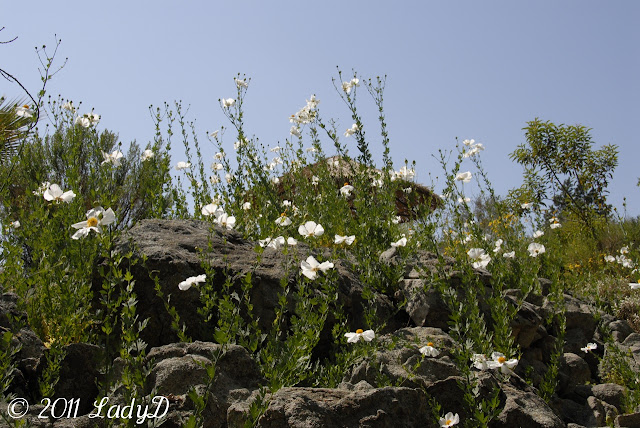'Tis my faith that every flower
Enjoys the air it breathes!
Enjoys the air it breathes!
~William Wordsworth, "Lines Written in Early Spring," Lyrical Ballads, 1798
The Matilija Poppy is a shrubby perennial, heavily branched and woody, reaching up to 8 feet. The large fried-egg flowers are native to California and grow especially well in the San Diego area.

The name Matilija, of Chumash origin, relates to Chief Matilijah who lived in Ventura County. In the wild, these flowers are known as 'fire followers.'
There was a lovely display on the Kelly Ranch in Carlsbad, California that our family enjoyed passing by on our leisurely strolls. The girls were especially tickled to see the large Matilija Poppy flower swaying in the warm breeze along the old wooden fence just outside Kelly's barn.
My dear mother-in-law has always been quite fond of the American Indian ways and my cousin Richard loves to talk and paint of Indian legend. I was fondly thinking of him as I continued reading on...
Legend of the Matilija
In the foothill canyons, the arroyos and dry washes of Southern California, blooms the Matilija poppy, which has justly been called the queen of wildflowers. Less common than the smaller prickly poppy and lacking its defensive spines, the Matilija (it's pronounce ma til' li ha) grows as a bush, its long, fleshy stems reaching up to 8 feet in height.
The flowers, which unfurl at dawn in the late spring, are 6 to 9 inches across, with six white petals, a sun-yellow center, and a delicate sweet fragrance.
The plant does not die after flowering, but persists year by year until flood waters, sweeping through the canyon, finally tear it away. If some part of the root remains behind, it will resprout. Otherwise, the seeds may lie long in the ground before germinating, waiting for the storm years to pass.
The Matilija poppy blooms among the hills east of San Diego, and had you arrived in that little town of wood and adobe in the days when Americanos were scarce and the ranchos prosperous from selling their longhorns in the goldfields up north, and had you wandered the dusty streets of the plaza in the afternoon, you might have noticed an old man dozing on the shaded porch of the General Store.
Most likely, he's perched atop a wooden olive barrel, eyes half-closed, head leaned back, propped against the wall. That's old Antonio. Most days you'll find him like that.
If you want to hear the legend of the Matilija, he's the one to ask. He knows many stories from the old days. Go ahead and sit beside him. It's not hard to get him started talking. The problem will come when you want him to stop....
"Eh?! What's this? Do you believe, young Jose, that I can no longer wrestle you to the ground, as I did when you were a child? A very bad thing, this lack of respect for one's elders. It's the American influence, I tell you.
"Well, and so you are a stranger in town. Come, sit in the shade awhile. It's not true, you know, what these young people say about me. I was not asleep, only resting a little ...and thinking. As one grows older, one learns the importance of quiet reflection on things of the past. Someday, you will discover this for yourself young man.
"And so, you have noticed our beautiful flower of Matilija? That is good. Few Americans take the time. You are an American? Yes, I thought so... Why thank you! Hard to find a good cigarillo these days. Everything goes up north, you know.
"But we were speaking of the white flowers. It was long before my time, of course... What's this, Jose? Will you sit here and listen to an old man ramble? And you too, Felipe? Very well, gather round then, all of you.
"I tell you, it is difficult to believe sometimes what things have been done in the name of Christ. And yet, they are true, these stories of the early Missions. Natives who could not be enticed willingly into the fold were roped like cattle and driven there. Those who tried to escape were hunted down on horseback. Lashings and slavery, a fine way to teach God's love and mercy!
"Little wonder then that Chief Matilija gathered supporters from many tribes in the place called Ojai, the Nest. From there, they attacked the Mission Buenaventura, driving off the cattle and plundering the stores.
"In return, soldiers hunted them through the hills. Their orders: to beat every bush, search every hollow, lash the renegades to the saddle or put a bullet through their head.
"Afterwards, the remaining Indians would slip out silently and gather their dead, carrying them up the canyon by way of stone steps hidden beneath trailing vines to their secret burial grounds. A place which the white man must never find.
"The daughter of Chief Matilija was captured on the second raid. She was proud as well as beautiful and during her four years of Mission life, she plotted how she might escape to the hills and find her father, Matilija, and the man Cocopah, her lover. She did not know if they yet lived, only that they had not been brought to the Mission.
"She joined in with the Mission life. It helped pass the time and also gained for her the confidence of the Padres. The more they trusted her, the better her chances for escape. It is said that she learned many things there and even became a true believer.
"Then, one day, news came secretly: her father and lover were alive at Ojai, the Nest. They were waiting for her!
"Many weeks passed before she found a gate open on a moonless night. She slipped out boldly. When, the following day, her absence was discovered, the other neophytes raised a rebellion so fierce it was days before any soldiers could be spared to look for her. By then she was well on her way.
"She found her lover living as a son of her father, for all her brothers and sisters had been killed. Chief Matilija arranged at once for the marriage, for his daughter's happiness was the only joy left to him.
"Gifts were exchanged, messages sent. At last the day came when she was lifted in the arms of a relative who carried her, dancing, to her lover's door, Chief Matilija walked before his daughter, scattering seeds in her path that her marriage might bear fruit.
"At that very moment, a volley of musket fire from the bushes mowed down the entire wedding party. Only the daughter of Chief Matilija escaped, hidden beneath the cloak of the relative who had been carrying her.
"After the soldiers left, she crawled out from hiding. Her father and relatives were all dead. Only her lover, Cocopah was still alive, though just barely. He was severely wounded.
"She nursed him as she knew how, with healing herbs and waters from the mineral spring. But he died in her arms, and so ended the love dreams of the last Matilija.
"Well, many years passed before a stranger climbed the stairway to the headlands. (As I told you, all this was long before my time.) And what do you think he found there? To this day, white flowers of the Matilija poppy cover the grave of the lovers, a more beautiful burial shroud than the hand of man could devise...
"Eh? What is that, Jose? What do you mean, 'Who was the stranger?' What stranger? Now listen. Speaking of lovers, have I ever told you the story..."
Robin Hewitt, 1989
http://www.robinhewitt.com
LadyD books is participating in:
Quote It Saturday and Flowers on Saturday



Wonderful work!
ReplyDeleteHave a great day...
Glad to be following you!
Beautiful flowers and quotes! Thanks for participating!
ReplyDeleteGreat post! Thanks for sharing this interesting info.
ReplyDeleteI really enjoyed the legend of this lovely little flower. I have never heard of the Matilija poppy before, thanks for the info.
ReplyDeleteHave a great rest of the weekend!